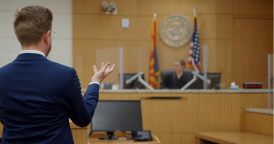Criminal Department Frequently Asked Questions
Contact your attorney for information on what to do next. If you don’t know who your attorney is, follow these steps:
Use the Criminal Court Case Information search tool to look up this information. You can search by name, initials and date of birth, or by case number. If you are unable to find the information you are looking for, call our Criminal Department Information number at 602-506-8575.
Coming to court on time is important. If you think you may be late for your hearing, contact your attorney as soon as possible.
If you can’t come to your hearing, contact your attorney as soon as possible. Your attorney will be able to file a motion with the Court to ask for your hearing to be reset.
There are many public parking lots and garages in Downtown Phoenix.
Give yourself extra time to find parking before your hearing is scheduled to start.
Unfortunately, the court does not validate parking for any parking lots or garages in the area.














